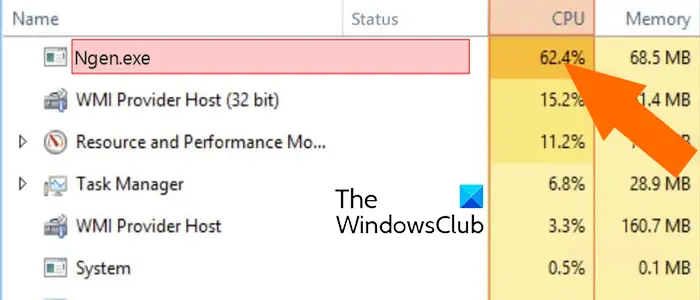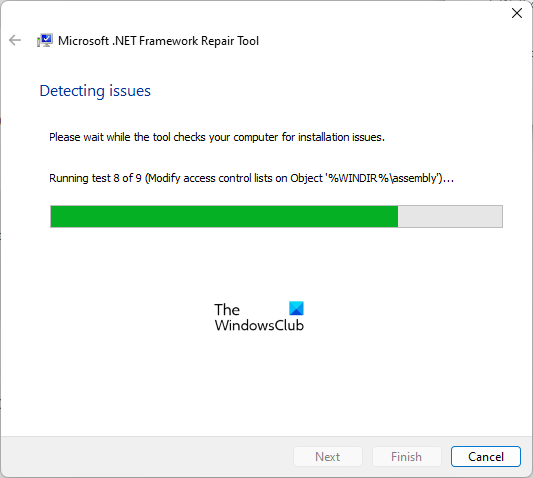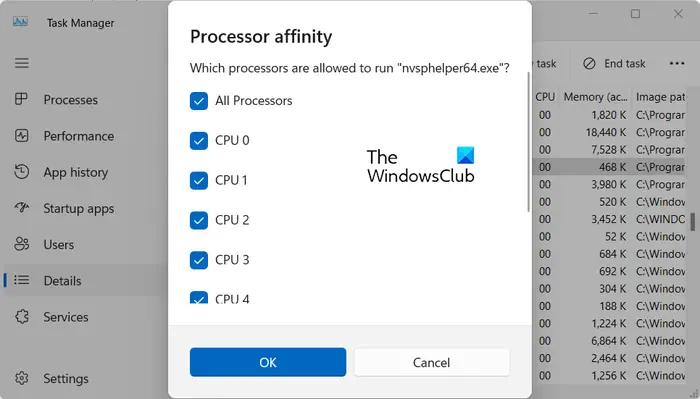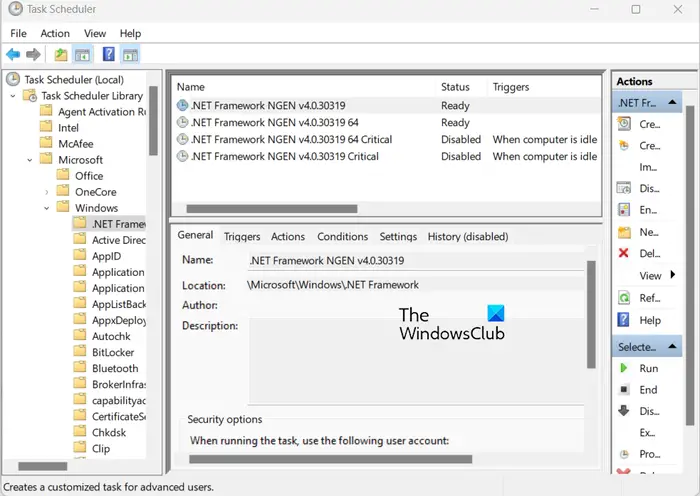In this post, we are going to show you how to fix the high CPU usage of Ngen.exe on Windows 11/10.
What is Ngen.exe?
Ngen, which stands for Native Image Generator, is a useful process, located in the C:\Windows\Microsoft.NET\Framework\ folder, that enhances the overall performance of managed applications. It basically creates native images that store the compiled processor-specific machine code, which is installed into the native image cache on your computer. These native images are used by the runtime for compiling the original assemblies that target .NET Framework only.
Now, some Windows users have reported that Ngen.exe is consuming a high CPU usage, causing their PC to stutter, crash, or become unresponsive. If you are one of the affected users, you can follow the below fixes and resolve this issue.

Fix Ngen.exe High CPU usage in Windows 11/10
If you are experiencing high CPU usage of Ngen (Native Image Generator) on Windows 11/10, here are the solutions you can use to fix the problem:
- Preliminary checks.
- Repair/Update .NET Framework.
- Allocate more CPU to the Ngen.exe process.
- Disable .NET tasks (if not in use).
1] Preliminary checks
- Before trying other fixes, make sure your Windows OS is up-to-date. Such issues usually occur if you have not installed available Windows updates and are using an out-of-date Windows. So, update Windows and check if the problem is resolved.
- If there are too many unnecessary programs running in the background, you might face this issue. So, open Task Manager using Ctrl+Shift+Esc and close all non-essential background apps using the End task button.
- If there are some .NET applications that you don’t use anymore, uninstall them and see if the issue is fixed.
Read: Services and Controller app High CPU usage in Windows.
2] Repair/Update .NET Framework

You can try repairing .NET Framework and see if the issue is resolved. Open Settings using Win+I, go to the Apps > Installed apps section, look for the Microsoft .NET Framework application, click on the three-dot menu button present next to it, and choose the Modify option. In the appeared prompt, click on the Repair button. Once the process is complete, see if the issue is fixed.
This problem can also occur if your .NET Framework is outdated. Hence, update .NET Framework and check if the problem is resolved. You can download the latest version of .NET from the Microsoft website and then install it on your system.
3] Allocate more CPU to the Ngen.exe process

If the problem of high CPU usage of Ngen.exe persists, you can try increasing the number of CPU cores assigned to the process. Here are the steps to do that:
- First, press Ctrl+Shift+Esc to launch Task Manager and move to the Details tab.
- Now, right-click on the ngen.exe process and choose the Set affinity option from the appeared drop-down menu.
- Next, enable the checkboxes associated with CPU cores that you want to assign to the process like CPU 0, CPU 1, CPU 2, CPU 3, etc.
- Once done, press the OK button to save changes.
Check if the problem is now fixed.
Read: Do more CPU Cores mean better performance?
4] Disable .NET tasks (if not in use)

If you are not currently using .NET Framework, you can disable the related tasks. For that, follow the below steps:
- First, open Task Scheduler using the taskbar search option and go to the below location:
Task Scheduler Library/Microsoft/Windows/.NET Framework
- Now, disable all the tasks related to .NET Framework; right-click on the task and choose the Disable option from the appeared context menu.
Note: Do not disable .NET Framework if you are using related apps as that can cause major performance issues.
I hope this helps!
Now read: Fix .NET Runtime Optimization Service High CPU usage
How do I fix System high CPU usage?
High CPU usage on Windows can be caused due to running heavy-duty games and apps, running too many programs at the same time, having a malware infection on your system, and some other reasons. So, to avoid the issue, you can close unnecessary programs, keep your system and apps up-to-date, run a virus scan, perform SFC and DISM scans, update your device drivers, etc.
See: Fix Search Indexer High Disk or CPU usage in Windows.
Why is WSAPPX using so much CPU?
WSAPPX is a genuine Microsoft Store process that includes services like AppX Deployment Service (AppXSVC) and Client License Service (ClipSVC). If you are facing a high CPU usage of WSAPPX, the problem might be caused due to low virtual memory. Other than that, if there is a virus present in your system, you are likely to face this issue.
Leave a Reply